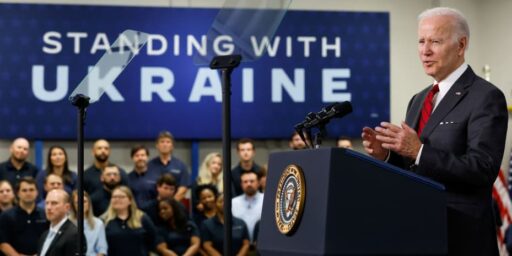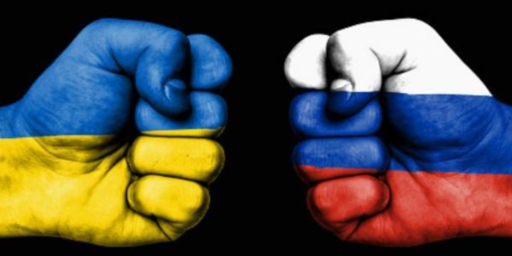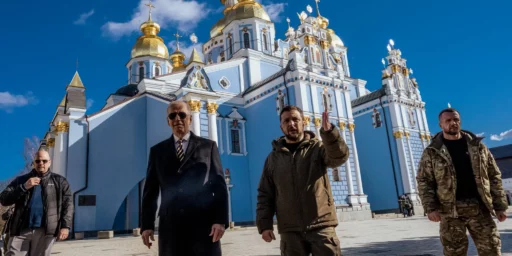Line of the Day
From a WaPo piece on the FSB and Ukraine.

So, I am reading a piece in WaPo from earlier in the week about how badly the Russian intelligence service, the FSB, screwed up the pre-invasion of Ukraine: Russia’s spies misread Ukraine and misled Kremlin as war loomed. The piece is a very detailed account of the FSB’s (and the Kremlin’s) hubris concerning the ease by which they expected to take over Kyiv and the Ukrainian government.
I was going to include the piece in a list of quick hits/tab clearing until I came across what, to me, is the funniest line in a non-funny new story I have read in some time. It was worth highlighting the following:
The FSB did not respond to requests for comment.
Shocking, I know.
Kudos for trying, I guess.
At any rate, the whole (lengthy) piece is worth reading.






That line really needs a “no shit” as an addendum.
Now, let’s have a bit of empathy for the FSB. Who among us would have wanted to tell Putin that Ukraine wouldn’t roll over and die when Russian paratroopers showed up? Or that in truth, Ukrainians held little hatred for the Russian people, but despised the thought of being ruled by Russia once again.
No, it would be easier to tell him what he wanted to hear and then blame the military for the operational failure.
Wonder if the FSB was telling Putin the Russian would be greeted with flowers? Thank God something like that could never happen here.
I expect that line flowed more from standard operating procedures than from any sense of whimsy, but yes, hilarious in context.
The article was fascinating but, not surprisingly, had no answer to the obvious question: WHY they got it so wrong.
There was not her article, also fascinating, about how sure the US was that Ptin was going to invade and how certain everyone else (the Europeans, the Ukranians themselves, surrounding countries) was that it was a bluff. One possibility is that the Russians were spreading disinformation and everyone was buying it except the US. Which implies they had a source that was extremely knowledgeable and extremely credible. Can’t be too many people in that category. Of course, it could have been electronic…
@MarkedMan:
Because Putinism requires that everyone in Russia lies, no? Confirmation bias is obligatory, to keep Ivan The Terrible 2.0 happy.
We shouldn’t gloat too much, afterall, it was only a year ago that that our multi billion dollar investment in the Afghan government and military collapsed before we even left the country. Our intelligence operatives were telling the admin that Afghanistan’s military would hold out for at least a year.
I recall stating shortly before the offensive a number of things plain to anyone who’d spoken much to ordinary Ukrainians, and to foreigners who’d worked with them:
– Russian speaking does not equate to ethnic Russian.
– Ethnic Russian does no equate to “loyal to Mother Russia”.
– What appear to be “ethnic” political divisions are often related more to entrenched interests (inc. oligarchs and mafias).
– Cynicism about politics does not equate to passivity in the Russian mode.
– Ukrainians tend to be more motivated by justice and mutuality than by laws and “authority”; there is a massive anarchist streak in them.
– Social solidarity may trump political allegiance.
– Ukrainian armed forces have changed a lot since 2014; and have massive reserves and capacity to innovate and adapt.
– Above all, they really, really hate the idea of being ruled by Russian autocrats again.
This was not me being brilliant (though I am, of course 😉 ) but simply listening, looking at some polling data, and having a rather basic level of understanding of Ukrainian history.
If there is anything beyond being a classic example of “telling the boss what he wants to hear”, it may be that Muscovite/Petersbuger Russians have a long history of disdain for Ukrainians.
They seem find it very difficult to process that parallel histories have produced very divergent social attitude sets.
A similarity that occurs to me: the inability of some English to understand the political and social attitudes of the Irish, and a casual assumption of cultural superiority.
@MarkedMan:
One reason was that it was such an incredibly stupid thing to do.
I recall being undecided: the forces deployed indicated genuine threat intent.
But remained insufficient to hold and control all Ukraine.
And war seemed a crazily disproportionate response to the situation.
The risk/reward balance was so irrational, especially given the Russian dependence on hydrocarbon exports to Europe, and imports of European consumer and capital goods.
OTOH, autocracies are notoriously liable to start believing in their own “alternative reality”.
It appears that FSB failed to alter Putin/Kremlin elite pre-existing view.
That Ukraine was a “Potemkin state” without a strong and tradition based ruling force, it’s people as apathetic as the Russians.
Which is daft, because:
But seems Kremlin decided a “decapitation strike” at Kyiv would enable Putin to impose a political settlement of his choice, without need for a full-on war of conquest, or the occupation of the whole country.
Therefore popular discontent could be ignore; and after all, what choice do the serfs have but to submit and obey?
A massive misunderstanding of the political/social reality, and the military capability of Ukraine, but there you go.
I’ll say again: the differences in political/social culture of Russians and Ukrainians are profound, and likely difficult for Russians to process, being rather unflattering.
Most of Europe (and Ukraine) thought Putin was running a “short of war” destabilization plan (and FSB infiltration was part of that) because “they wouldn’t do something that stupid and crazy”.
Well, they did.
V. Putin: “I remain the worlds greatest master of strategergy”
@JohnSF: @JohnSF:
That. They’ve seen what it’s like to be Russian and they’ve seen what it’s like to be part of Western Europe. Apparently a lot of them would risk death to avoid being Russian again. And a lot of Russian citizens have been exposed to the West.
The article stresses your point that a big reason the Europeans and Zelenskyy didn’t belief Putin would invade was simply that it made no sense.
@JohnSF:
The plan was a redo of what worked well in 1968 in Czechoslovakia. The intent was control of most of Ukraine, possibly minus the extreme western part.
@gVOR08:
The attitude towards Russian control evolved a lot after 2014 because of seeing what Russian control of the Donbas was like.
@gVOR08:
It’s partly the increasing experience of interaction with Europe (not so much western perhaps, as the experiences of other escapees from the Russian/Soviet sphere)
But also a long history of really unpleasant interactions with the Russian and Soviet regimes.
It’s a long story.
A lot of peasant ancestors of Ukrainians moved there to escape Muscovite (and Polish) serfdom; part of the history of the Cossacks.
The Russian empire recaptured them in the 18th Century; and being reduced to serfdom was very close, if not identical, to being a chattel slave.
See eg the life of Taras Shevchenko:
So, Russian rule, not a lot of fun.
They attempted to break away in 1917/21 and were crushed.
Then the Holomodor.
The resulting hatred of Russian/Soviet rule partly explains why some welcomed the Germans as liberators; only to find out their horrible mistake later.
(There is also the issue of populist anti-Semitism, which is a book in itself)
But anyway the, base Ukrainian feeling now, in relation to their entire history, can be summed up by what one Ukrainian said to me:
“We were free. We were enslaved. Never again.”
And they mean it.
That Post piece is part of a Post series of 5 pieces on Ukraine, at the bottom are links to the other pieces in the series.